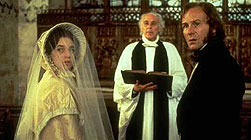|
|
|
|
Jane
Eyre
|
 |
|
There are certain films which are lacklustre in almost every department except one: the story, particularly if derived from a much-loved novel or play, which retains its essential magical, resonant ingredients. This is definitely the case with Franco Zeffirelli's version of Charlotte Bronte's Jane Eyre. This is a prime example of the Illustrated Classics approach to literary adaptation which film critics love to hate. Zeffirelli's direction is bland, inert, as dull as dishwater in comparison with (for instance) Scorsese's work on The Age of Innocence (1993). Zeffirelli's inexplicable choice of an airy, autumnal, over-lit atmosphere works against the more sombre, gothic aspects of the tale. To make the going even rougher, Zeffirelli and co-writer Hugh Whitemore have taken a thoroughly pre-modern approach to this adaptation – making absolutely no concession to the sophisticated, media-saturated mind-set of a contemporary audience (unlike the contemporary version of Sense and Sensibility [1995]). There is a naïve, creaky, archaic quality to this Jane Eyre, particularly when it comes to the ghostly wailings that haunt Jane's abode at night. Yet there is also something undeniably plaintive about such naïveté, and this is where the magic of Bronte's original re-enters the picture. The soulful pining of Jane (Charlotte Gainsbourg) for love and independence of spirit; sad-eyed Rochester (William Hurt) with his murky past; the gauntlet of social oppressions and humiliations that beset Jane as orphan and then governess – all of this still has the power to move and enthral. The actors are a mixed bag. Several (including Geraldine Chaplin) strut about like pompous secondary players in a bad Merchant Ivory production. Joan Plowright is commendably understated, for a change. Hurt's somewhat mannered interpretation of Rochester is the film's only slightly modern touch. Gainsbourg is luminous in her directness and simplicity – although there are so many sudden reversals of melodramatic fortune in the final stages of this story that she never really achieves the passionate catharsis that the audience longs to experience. MORE Zeffirelli: Tea with Mussolini © Adrian Martin July 1996 |
![]()